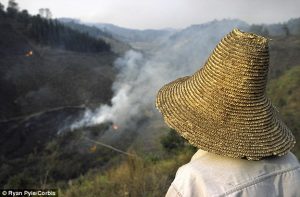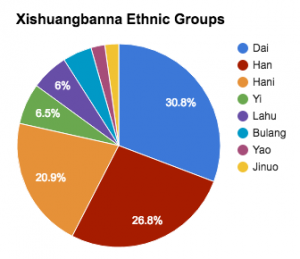There are 1.1 million people in Xishuangbanna. This number is composed of “13 distinct ethnic minorities whose traditional land-use systems play a crucial role in maintaining the region’s outstanding biodiversity” (Xu, 2006).

The Dai people are the most populous group in Xishuangbanna, followed by the Han, and the Hani. “These three groups combined constitute 71% of Xishuangbanna’s population” (retrieved from Situational Analysis Report: Xishuangbanna Autonomous Dai Prefecture Yunnan, China). The Dai have worked the lands for thousands of years relying on many traditional farming practices to protect the environment and encourage biodiversity; this mission to protect the environment is fueled by their religious beliefs which claim that harm to the environment is detrimental to both the spirit and the self (Liu, Xu, Xu, and Wang, 2002).

When the Han immigrated at massive rates during the 1950s the central government had a very clear goal in mind, to civilize the indigenous peoples and unify them with the nation. The government ended the Dai’s self governing practices and halted local trade by simplifying the land. As a result they grew apart from their religion and culture as they were forced to exploit their holy lands. At one point the government banned ancient practices and claimed in the name of science that they were the root cause of the environmental degradation. The government constantly appointed the Han to positions of power by hiring them in the rubber plantations and local government positions. Consequentially this gave the Han economic and social benefits and robbed the indigenous peoples of opportunities. (Xu, 2006)
Xishuangbanna’s indigenous peoples have been historically put down by the Han people, or the dominant ethnic group in China. They are denied social and economic opportunity leading to large accounts of racism and classism. Overall this oppressive history has given more power and privilege to the Han and has reinforced the primitive backwards narrative on the indigenous Xishuangbanna groups.
